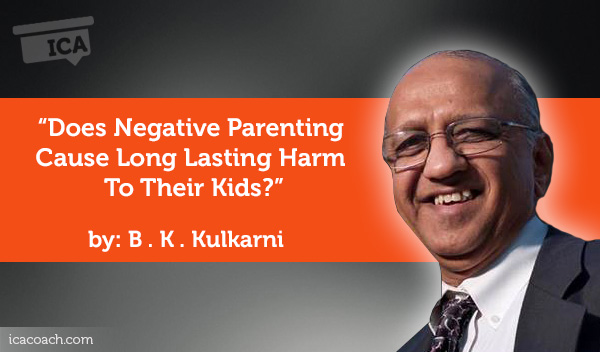 Research Paper By B . K . Kulkarni
Research Paper By B . K . Kulkarni
(Life Coach, INDIA)
An introspective Article
There is a saying
You are what you were in kindergarten.
This highlights the importance of early childhood development. The love and security a child feels during these tender years has a great impact on how balanced and confident the individual will grow into.
There are some aspects that SHOULD be given importance to by all who are in a parenting role.[6]
Parenting is indeed quite a responsibility to be carried out with lot of love and understanding. Many a times people are ignorant about this great connection between home environment and personality development of children.
Parenting is a privilege. The right of parents to maintain a strong involvement in their child’s life has been continually upheld by Supreme Court decisions.
Negative parenting continues to impact through the teen and adult life. Following are the few common causes of negative impact manifested in the glaring examples I have come across in my life coaching scenarios.
Broken Dysfunctional Homes:
A messy divorce, alcoholism or domestic violence caused unrest at home, has a long lasting impact on all family members especially the kids. These kids carry these feelings of betrayal, violence, mistrust, etc., into their teen years and if not addressed, into their adult life too. Men who as children witnessed their parents’ domestic violence were twice as likely to abuse their own wives than sons of nonviolent parents. These people will also have trouble making good friends , creating long lasting relationships and hence show the symptoms of lonely living.
Highly Affluent Homes:
As against broken home environment, many rich families with parents pre occupied with their own life style ignore the kid’s developmental years. Easy access to money and all facilities on demand, these kids grow up with lot of arrogance and risky life styles. They will have trouble to sustain any long relationships and end up in trouble with law. Always remember children will mimic the parents at an early age.
Sibling and Peer Comparison:
We have 5 fingers and all are not of the same size. Most children are challenged whenever a new baby enters the home. We have siblings with different tastes, skills and levels of learning ability. Constantly comparing kids on their academic performance puts lot of pressure on under performing kids. These kids feel they are no good. These underlying beliefs creep in to adult life as very low self-esteem and self-doubt. These kids cannot manage their life well and if they happen to be in people management positions, they may be the worst managers.
“Look at your sister, how smart she is”.
“Next-door boy is smarter than you. Why don’t you come close to what he is.”
A parent constantly using such language puts pressure on the child and demotivates the child . The environment is hostile and there is no peace in the house. Kids from such environment suffer from inferiority complex and feel they are no good. Sometimes, this constant feeling of “no good” may drive them to take extreme steps with their life.
Over-protective & Restrictive Environment:
Some parents raise their kids in a very protected & authoritative environment. They pressurize their children to blindly follow their own values and religious beliefs.
The discipline doctrine may appear good in the early stages of life but stops children from taking independent decisions. These children may grow up with rebellious nature. They feel their childhood has been stolen from them and when they get the freedom they try to overindulge in every thing to make up for their loss. These kids tend to have a lot of anger and may end up being disconnected with the family. They may even find solace with Substance abuse and Alcoholism.
Absentee parents:
Due to career driven circumstances/aspirations of parents, kids growing up in both parent present environment is becoming a rarity, as in long-term military service deputations, and lucrative overseas/cross country assignments.
In a May 2012 article for Psychology Today, Edward Kruk, author of “Co-Parenting After Divorce,” expresses concerns that fathers’ contributions to children are consistently devalued by social institutions, leading to homes in which the mother is the primary parent. Kruk reports that children in homes where fathers are not involved in their lives experience diminished self-esteem, behavioral problems, truancy, poor academic performance, delinquency and homelessness, as well as teen pregnancy.
Clinical psychologist Judith Arndell notes that a mother can be physically present but emotionally absent, due to drug abuse or mental illness, or might have been divorced or abandoned the child. Arndell notes that abandonment by the mother causes trauma, depression and fears that the child may carry into adulthood. Abandonment also causes anger, insecurity, and fear of rejection, impulsive behaviors, self-destructive behavior and poor self-esteem.
In all the above scenarios when children start showing early signs of dis connect with family, school and friends. School academics becomes first victim followed by behavioral issues with anger, trouble making friends and may in some cases substance abuse and trouble with law. Children Bureau under US department of Health and Human Services keep track of all “Child Maltreatment” about child abuse and neglect. More information can be found on www.acf.hhs.gov . Types of Mal Treatment categorized under US child bureau are neglect , physical abuse ,psychological Mal treatment and sexual abuse.
An early intervention with counseling, mentoring followed by lots of family support these kids can restore some normalcy to their life. If not addressed properly these symptoms get carried in to adult years.
How Coaching can help:
In a typical life coaching scenario we will be tackling with low self esteem, struggle with relationships, anger management, mistrust and last but not the least, depression to name a few. When you analyze deeply, even though many of these symptoms may be showing up in adult life, as having trouble with relationships, emotional outbursts, anti social behaviors, they all have some strong roots to early childhood experiences as cited above.
In few of the instances above, the intention of the parents may be good. There is nothing wrong in sharing a neighbor’s academic or sports success. But the way it is presented is the key to relaying the intention of the sharing.
A client always played down when it came to higher promotions and larger responsibilities at work because he thought he was not good in communication. With more exploration of talking to him ,he sounded perfectly fine and good command over the language. Further discovery led to his childhood scenario where his friends / family members told him that he has a gibberish voice and it sounded female. This got stuck in his head and he was never able to remove this underlying belief. With shift in perspective and constant encouragement from a coach he could overcome this fear. Today, with new confidence, he is a Toastmaster member with 7 speeches under his belt and has a dream to pursue that “ C” level promotion!
It is very important to use descriptive terms and avoid negative words like insecure , dumb , lazy ,jumpy and hyper etc . Each of negative tem can replaced by a neutral or even positive description like Energetic instead of hyper ,dramatic instead of explosive etc [7]
Similarly, another client had a very low self-esteem because of constant comparison between him and his cousins and friends by the parents. He was feeling his life was a waste and not worth living! With coaching, reframing his perspective on the situation he was in, he could achieve many of the things thought he was not “entitled “ to!!
I came across a situation where a person never made truce with his parents for constantly calling him a failure, as his two siblings were high achievers. He had an early death with massive stroke before he could come to terms with his parents nor the parents accepted him the way he is. Parents regretting now has no meaning. It is a day late and dollar short as the saying goes.
Conclusion:
With hundreds of books and seminars and workshops on parenting, situations described above continue to happen. This is because we come with our own underlying belief system, our own growing-up experiences. We are challenged with coping up with parenting along with day-to-day stress of living. The materialistic world we live in is too tempting. Two working parents and nuclear family set up, makes kids more vulnerable for the distractions than ever before. It is absolutely important that kids grow in an environment of unconditional love and acceptance totally unbiased.
There is no one size fits all solution.
It came as a big surprise when a boss of mine who had invited us for his second child’s first birthday told us that “no gifts” but if you insist you should bring two one for the elder child also . That is a real sensitive parenting indeed.
Harmony in the home, seeing the situation through child’s view ,giving your full attention to children ,helping their problem however trivial may be and being consistent with our instructions will help child’s holistic development . Unfortunately any of the situation mentioned above if the child is going through will affect child’s holistic development. [6]
Parenting is in many way a balancing act and doing each aspect of the child need in moderation.
GIFTED – Inspiring Stories of People with Disabilities ( Random House India Publication) has 15 remarkable and inspiring stories of how people remain focused and positive under extreme conditions. Behind the story of these extraordinary people is the support of committed , loving and selfless parents.
Parenting is pretty much like coaching. Be there, support them, listen to them, question them, empower them and let them write their own destiny to become what they want to be – not what parents want them to be
Few Inspirational Quotes on parenting
There is no such thing as a perfect parent so just be a real one. – Sue Atkins
Kids are like a mirror, what they see and hear they do. Be a good reflection for them. – K. Heath
The rules for parents are but three: love, limit, and let them be. – Elaine M. Ward
It is easier to build strong children than to repair broken men. American abolitionist Frederick Douglass’s words of wisdom….
Parenting SKILLs the 5 Ps: Passion, Positive input, Patience, providing practice and being consistent & providing opportunities to learn.
Stop trying to perfect your child, but keep trying to perfect your relationship with him. Dr. Henker
Parents: People who spend half their time wondering how their children will turn out, and the rest of the time when they will turn in. Eleanor Graham Vance
Parenting tip: complement your child on something well done when they don’t think you are looking! Kevin Heath
When you have children yourself, you begin to understand what you owe your parents.
Japanese Quote
Acknowledgements:
Instances and example from live Coaching experience. Without mentioning name author is grateful to clients who shared there experiences.
Toxic Parents: Author Susan Forward & Craig Buck
Interview / Review by Special Need children Teacher
Gifted Author: Sudha Menon & V R Ferose
An Absent Parent and Self-Esteem in Children by Beth Greenwood
Joy of Parenting –A guide book for Early Childhood Years –BMRF Publication
Understanding Your Child’s Temperament –William B Carey MD